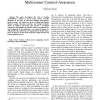Free Online Productivity Tools
i2Speak
i2Symbol
i2OCR
iTex2Img
iWeb2Print
iWeb2Shot
i2Type
iPdf2Split
iPdf2Merge
i2Bopomofo
i2Arabic
i2Style
i2Image
i2PDF
iLatex2Rtf
Sci2ools
125
Voted
PERCOM
2007
ACM
2007
ACM
The Role of Probabilistic Schemes in Multisensor Context-Awareness
This paper investigates the role of existing "probabilistic" schemes to reason about various everyday situations on the basis of data from multiple heterogeneous physical sensors. The schemes we discuss are fuzzy logic, hidden Markov models, Bayesian networks, and Dempster-Schafer theory of evidence. The paper also presents a conceptual architecture and identifies the suitable scheme to be employed by each component of the architecture. As a proof-of-concept, we will introduce the architecture we implemented to model various places on the basis of data from temperature, light intensity and relative humidity sensors.
Heterogeneous Physical Sensors | PERCOM 2007 | Relative Humidity Sensors | Various Everyday Situations | Wireless Networks |
| Added | 24 Dec 2009 |
| Updated | 24 Dec 2009 |
| Type | Conference |
| Year | 2007 |
| Where | PERCOM |
| Authors | Waltenegus Dargie |
Comments (0)

